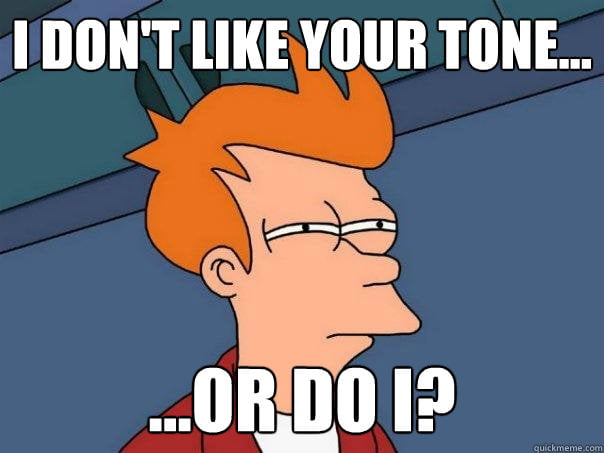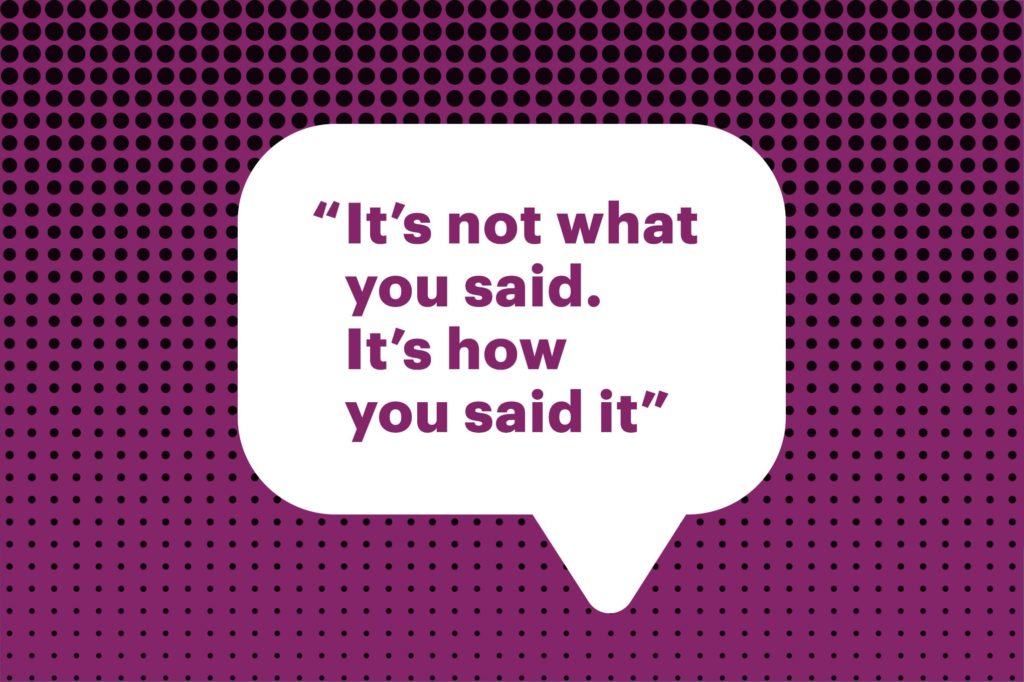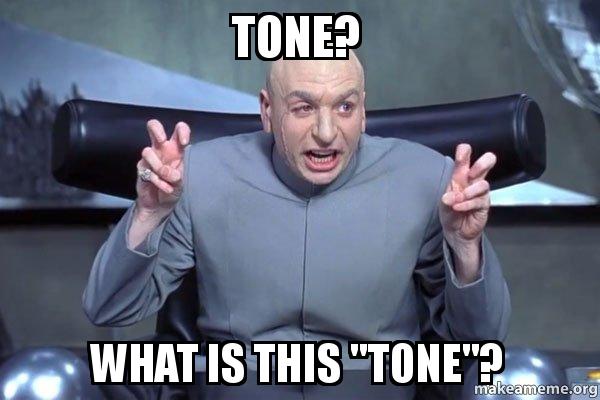An author uses tone words to project or insert their attitude and opinion into their writing. It’s the choice of grammar and how they put words and phrases together. Also, it’s the level of formality that is chosen.
In fiction, the narrator’s attitude is expressed using tone words. It gives shape to the story and provides the voice for characters.
In non-fiction, tone words are used to express the writer’s attitude toward his subject. It indicates to the reader how they should read the text — funny, serious, angry, friendly, etc.
What Is a Tone Word?
Tone words are a specific set of adjectives that make the author’s opinion on the subject matter known. They can generally be divided into three categories: positive, negative, or neutral connotation. But inside those categories, tone words can be happy, sarcastic, funny, or any other adjective you can think of.


Example #1
Teacher: You made an A on the test.
Student: “That’s incredible news!”
– The tone of the student is positive.
Example #2
Teacher: You made a B on the test.
Student: “Of course. I knew it.”
– The student’s tone is sarcastic.
Example #3
“You made a pathetic C on the test.”
– The tone is negative in this example.
Example #4
“The student looked world-weary while taking the exam.”
– The tone is not positive or negative. It’s neutral.
Positive Tone
If you’re writing for a company use a positive tone. It’s clearer. The phrasing is simpler and it uses fewer words.
By positioning your messages positively, you encourage others to see the vision that the company is hoping to portray.


A positive tone is another way to build organic authority.
Negative Tone
A negative tone shouldn’t be used when representing a business. It makes your audience feel defensive.
Who wants to conduct business with someone who is not pleasant?
A negative tone has a useful place in creative writing and when expressing your opinion.
Don’t let the word “negative” make you feel as if you shouldn’t use it.
Think of how different the character of Mister Wilson in Dennis the Menace or Archie Bunker in All in the Family would have been without the use of negative tone words.
Neutral Tone
Remember the teacher in Ferris Bueller? This is how I imagine neutral tone sounds. It’s just the facts and not emotions.
A neutral tone leaves the reader to interpret how the author feels on the subject.
Never leave your tone up for interpretation unless this is an editorial choice.
List of Tone Words
This is the most well-organized and comprehensive list of tone words. After doing extensive research, I’ve broken them into positive, negative, and neutral categories. I have also included synonyms for easy reference.
Is Positive a Tone?
An author can absolutely use a positive tone. Here is a list of positive tone words:
- Admiring | approving |respectful | praising
- Amused | entertained | pleased
- Animated | lively | spirited |impassioned | vibrant
- Apologetic | repentant | remorseful | acknowledging failure
- Appreciative | grateful | thankful | enthusiastic
- Ardent | enthusiastic | passionate
- Assertive | self-confident | strong-willed | authoritative | insistent
- Awestruck | amazed | reverential
- Benevolent | sympathetic | tolerant | generous | caring | well-meaning
- Candid | truthful | straightforward | honest | unreserved
- Celebratory | praising | glorify | honor
- Chatty | informal | lively | conversational | familiar
- Colloquial | familiar | informal| casual
- Comic | humorous | witty | entertaining | diverting
- Compassionate | sympathetic |empathetic | warmhearted | tolerant | kind
- Compliant |agree|acquiescent | flexible | submissive
- Conciliatory | placate | pacify |appeasing
- Curious | inquisitive | questioning
- Dignified | serious | respectful | formal | proper
- Diplomatic |tactful | subtle | sensitive | thoughtful
- Earnest | serious
- Empathetic | understanding | kind | sensitive
- Encouraging | optimistic | supportive
- Enthusiastic | excited | energetic
- Excited | stirred
- Forceful | powerful | energetic | confident | assertive
- Formal | respectful | stilted | factual
- Gentle | kind | considerate | mild | soft
- Humbled | referential | modest
- Humorous | amusing | entertaining | playful
- Impassioned | ardent
- Inspirational | encouraging | reassuring
- Intense | earnest | passionate | concentrated | deeply felt
- Intimate | familiar | informal | confidential | confessional
- Joyful | positive | optimistic | cheerful | elated
- Laudatory | praising | recommending
- Light-Hearted | carefree | relaxed | chatty | humorous
- Loving | affectionate
- Nostalgic | wistful | romantic
- Objective | fair
- Optimistic | hopeful | cheerful
- Persuasive | convincing | eloquent | influential | plausible
- Philosophical | theoretical | analytical | rational | logical
- Playful | humorous | jesting
- Pragmatic | realistic | sensible
- Reverent | esteem
- Righteous | guiltless | pious | god-fearing
- Sincere | honest | truthful | earnest
- Sympathetic | compassionate | understanding of how someone feels
- Thoughtful | reflective | serious | absorbed
- Tolerant | open-minded | charitable | patient | sympathetic | lenient
- Virtuous | lawful | righteous | moral | upstanding
- Whimsical | quaint | playful | mischievous | offbeat
- Witty | clever | quick-witted | entertaining
- Wonder | awe-struck | admiring | fascinating
Negative Tone Words
- Absurd | illogical | ridiculous | silly | implausible | foolish
- Accusatory | complaining
- Acerbic | sharp | forthright | biting | hurtful | abrasive | severe
- Aggressive | hostile | determined | forceful | argumentative
- Aggrieved | indignant | annoyed | offended | disgruntled
- Angry | incensed | enraged | threatening | menacing
- Apathetic | indifferent | unemotional
- Arrogant | pompous | disdainful | overbearing | condescending | vain | scoffing
- Belligerent | hostile | aggressive | combatant
- Bitter | angry | acrimonious | antagonistic | spiteful | nasty
- Bleak | desolate | lifeless
- Callous | unfeeling | uncaring | indifferent | ruthless
- Caustic | corrosive | critical
- Condescending | patronizing
- Concerned | worried | anxious | apprehensive
- Contemptuous | scornful | insolent | mocking
- Critical | disapproving | scathing | criticizing
- Cruel | unkind | spiteful | severe
- Cynical | scornful | mocking | sneering
- Defensive | shielding | guarding | watchful
- Defiant | obstinate | argumentative | defiant | contentious
- Demeaning | disrespectful | undignified
- Depressing | sad | melancholic | discouraging | pessimistic
- Derisive | snide | sarcastic | mocking | dismissive | scornful
- Disapproving | displeased | critical | condemnatory
- Disconsolate | downcast | sorrowful
- Disheartening | discouraging | demoralizing | undermining | depressing
- Disparaging | dismissive | critical | scornful
- Disappointed | discouraged
- Dismal | dull | barren
- Dispassionate | impartial | indifferent | unsentimental | cold | unsympathetic
- Distressing | heart-breaking | sad | troubling
- Egotistical | self-absorbed | selfish | conceited | boastful
- Enigmatic | puzzling | mysterious
- Evasive | ambiguous | cryptic | unclear
- Facetious | inappropriate | flippant
- Farcical | ludicrous | absurd | mocking
- Flippant | superficial | glib | shallow | thoughtless | frivolous
- Frustrated | annoyed | discouraged
- Ghoulish | revolting | loathsome
- Grimserious | gloomy | depressing| macabre
- Gullible | naïve | innocent | ignorant
- Hard | unfeeling | hardhearted | unyielding
- Haughty | arrogant | condescending
- Hostile | malevolent | bellicose
- Hypercritical | hair-splitting | nitpicking
- Imploring | pleading | begging
- Impressionable | trusting | child-like
- Inane | silly | foolish | stupid | nonsensical
- Incensed | enraged
- Incredulous | disbelieving | unconvinced | questioning | suspicious
- Indignant | annoyed | angry | dissatisfied
- Inflamed | irate | provoked
- Irreverent | pert | saucy
- Jaded | bored
- Judgmental | critical | finding fault | disparaging
- Macabre | gruesome | horrifying | frightening
- Malicious | ill-willed | spiteful
- Mean-Spirited | inconsiderate | unsympathetic
- Menacing | threatening | ominous
- Mocking | scornful | ridiculing
- Morbid | gruesome | macabre
- Morose | sullen | gloomy
- Mourning | grieving | lamenting | woeful
- Naïve | innocent | unsophisticated | immature
- Narcissistic | self-admiring | selfish | boastful | self-pitying
- Nasty | unpleasant | unkind | disagreeable | abusive
- Negative | unhappy | pessimistic
- Obsequious | submissive | fawning | groveling
- Outraged | furious
- Outspoken | frank | candid
- Pathetic | sympathy | tenderness
- Patronizing | condescending | scornful | pompous
- Pensive | reflective | introspective | philosophical | contemplative
- Pessimistic | negative | gloomy | defeated
- Pretentious | affected | artificial | grandiose | rhetorical | flashy
- Resentful | aggrieved | offended | displeased | bitter
- Sarcastic | scornful | mocking | ridiculing
- Scathing | critical | stinging | unsparing |harsh
- Scornful | scathing | dismissive
- Sensationalistic | provocative | inaccurate | distasteful
- Skeptical | disbelieving | unconvinced | doubting
- Sinister | cunning | portentous
- Solemn | serious
- Subjective | prejudiced | biased
- Submissive | compliant | passive | accommodating | obedient
- Sulking | bad-tempered | grumpy | resentful | sullen
- Tragic | disastrous | calamitous
- Vindictive | vengeful | spiteful | bitter | unforgiving
- Worried | anxious | stressed | fearful
- Wretched | miserable | despairing | sorrowful | distressed
Neutral Tone Words
- Ambivalent | uncertain | undecided
- Anxious | uncertain | apprehensive
- Bizarre | fantastic | grotesque
- Cautionary | reminding
- Complex | complicated
- Composed | calm | detached
- Confident | certain | assured
- Confused | bewildered | vague
- Courageous | audacious | fearless
- Desirable | comfortable | alluring
- Detached | aloof | objective | unfeeling | distant
- Direct | straightforward | honest
- Docile | compliant | submissive | deferential | accommodating
- Exotic | strange | intriguing
- Exquisite | pleasing | delicate
- Frank | honest | direct | plain | matter-of-fact
- Impartial | unbiased | neutral | objective
- Informative | instructive | factual | educational
- Ironic | snarky |sarcastic
- Passionate | intense | amorous
- Picturesque | detailed | unusual
- Provocative | provoking | stimulating
- Regretful | apologetic | remorseful
- Resigned | accepting | unhappy
- Restrained | controlled | quiet | unemotional
- Satiric | mocking | bantering
- Sentimental | tender | emotional
- Shocked | astonished | surprised
- Sincere | truthful | straightforward
- Sublime | lofty | magnificent
- Taciturn | reserved | subdued
- Unassuming | modest | self-effacing | restrained
- Unbelievable | amazing | dubious
- Uneasyworried | uncomfortable | edgy | nervous
- Urgent | insistent
- Wondrous | astonishment | amazement
- World-Weary | bored | cynical | tired
How to Use Tone Word Synonyms
Synonyms are key to helping with variations in your writing. INK is a web content optimization editor that recognizes when there are consecutive sentences that sound too similar. Using synonyms is paramount in quality writing.


For example:
She was amused with her image in the mirror.
Amused is a positive tone word.
You could also write:
She was pleased with her image in the mirror.
Amused is a stronger tone word than pleased. It conveys a more emphatic emotion to the reader. However, if you’ve used amused already in the paragraph, pleased offers a nice alternative
Here are some other tips for great content writing.
What Are Examples of Tones?
Examining writing styles in different mediums is a great way to explore just how impactful tone is in writing.
A short story should have a completely different tone than an opinion piece in the New York Times. Read a featured article in People Magazine and then compare it to an article in Newsweek.
Poetry is overflowing with tone words that paint such a vivid picture that the reader can see in their mind’s eye what the author wants you to.
Try duplicating these different styles in your writing. It will help improve your tone word usage.


I felt so depressed reading the obituary.
The word depressed is a negative tone word.
Her heart was filled with joy as she saw her baby for the first time.
The word joy is a positive tone word.
I’m resigned to the idea.
Resigned is a neutral tone word.
Tone Words in Poetry
The Tell-Tale Heart by Edgar Allen Poe
“It was A LOW, DULL, QUICK SOUND – MUCH SUCH A SOUND AS A WATCH MAKES WHEN ENVELOPED IN COTTON. I gasped for breath, and yet the officers heard it not. I talked more quickly, more vehemently but the noise steadily increased. I arose and argued about trifles, in a high key and with violent gesticulations; but the noise steadily increased. Why WOULD they not be gone? I paced the floor to and fro with heavy strides, as if excited to fury by the observations of the men, but the noise steadily increased. O God! What COULD I do?”
This is one of the most famous examples in literature of tone. You feel the character’s anxiety and fear.
Tone Words in a Novel
A Tale of Two Cities by Charles Dickens
“There was a steaming mist in all the hollows, and it had roamed in its forlornness up the hill, like an evil spirit, seeking rest and finding none. A clammy and intensely cold mist, it made its slow way through the air in ripples that visibly followed and overspread one another, as the waves of an unwholesome sea might do. It was dense enough to shut out everything from the light of the coach-lamps but these its own workings, and a few yards of road; and the reek of the labouring horses steamed into it, as if they had made it all.”
The tone is felt as mysterious, secretive, ominous, or evil through the use of words like clammy, followed, and unwholesome.
Tone Examples in a News Article
This article is from CNN.com style discussing the SR-71 spy plane.
The Lockheed SR-71, designed in secrecy in the late 1950s, was able to cruise near the edge of space and out fly a missile. To this day, it holds the records for the highest altitude in horizontal flight and the fastest speed for a non-rocket powered aircraft.
It was part of a family of spy planes built to venture into enemy territory, without being shot down or even detected, in a time before satellites and drones.
The black paint job, designed to dissipate heat, earned it the nickname Blackbird, and paired with the sleek lines of the long fuselage, made the plane look unlike anything that had come before — a design that hasn’t lost any of its brilliance.
The tone is informative, yet you still feel the author’s sense of reverence for this plane when he calls the design brilliant.
Tone Words in an Informative News Article
Now, compare to a newspaper article found on Chron.com
The Big Oil majors aim to unload about $27 billion in oil and gas assets worldwide in order to cut costs and focus spending on their core projects.
U.S. giants Exxon Mobil and Chevron for instance are concentrating their oil and gas spending on West Texas’ booming Permian Basin, as well as Guyana for Exxon Mobil and Kazakhstan for Chevron, according to a new report from the Norwegian research firm Rystad Energy.
The United Kingdom’s BP aims to sell some assets in the U.S., including in New Mexico’s gassy San Juan Basin, after spending $10.5 billion to buy the Texas shale assets of BHP.
Houston’s ConocoPhillips, for instance, already wants to sell its newer position in the Louisiana Austin Chalk for less than $1 billion, although other Houston firms Marathon Oil and EOG Resources are still operating in the region.
The tone is neutral. One cannot gleam from the tone if the author is for or against oil companies selling their assets.
Tone of Voice Example in Speech
“And so, my fellow Americans: Ask not what your country can do for you–ask what you can do for your country.”


United States President John F. Kennedy, Jr. used presidential tone in his inauguration speech in 1961.
He wanted this line to be unifying and patriotic. His goal was to get US citizens to rally behind him.
It’s now one of the most famous quotes ever.
How Do I Find the Right Tone for My Work?
Whether or you are writing a formal article for your client or a whimsical creative piece, it’s critical to determine your tone of voice before you begin. In formal writing, your tone should be authoritative and convey confidence. The reader should trust that you are providing them with the best information. In creative writing, your tone is what you choose it to be. Are you telling a sad or happy story? Is your story terrifying?


Whatever tone you choose, it should be communicated clearly and the reader shouldn’t have to guess.
1. Why Am I Writing This?
Let’s be clear. If you’re struggling to answer this question, take a deep breath and strongly examine your motivations.
Writing is time-consuming and writing without a purpose makes no sense. Your readers will pick up on this and not connect with your piece.
2. Who Am I Writing This For?
Know your target audience and who you’re trying to connect with. Your tone is critical that it matches what your reader is expecting.
3. What Should the Reader’s Take Away Be From This Article?
In the end, your tone of voice influences your reader’s opinion or understanding of the topic.
This is a huge responsibility, especially if you’re writing an editorial or opinion piece.
Ensure your tone is appropriate and on-point.
What Is the Difference Between Tone and Voice?
Voice is the author’s personality shining through in their writing. It’s the fingerprint that is left behind that is a tell-tale sign of who authored a piece. We all have a style of speech that is unique to us. For some, it might be the infliction they put on certain words. Others might use a local dialect and vocabulary. This is voice. It’s more permanent. Tone, on the other hand, is situational. It can change depending on your circumstances.
For example, if an author is crafting a short story about a particularly hard Chicago winter, they wouldn’t pepper the story with distinctly southern phrases.
Writing with a unanimous company voice is critical to the brand.


Is your company voice friendly and informative? Are you witty and add puns to your text?
Example of Voice
To Kill a Mockingbird by Harper Lee
Harper Lee’s To Kill a Mockingbird is an example of a character’s voice. Scout narrates the story. When she is young her voice sounds immature. As she grows, so does her vocabulary.
Scout also uses first-person to paint a scene that the reader can get lost in.
Example of Tone
The tone of To Kill a Mockingbird changes over the course of the novel as Scout’s voice changes.
It evolves from innocent to dark and knowing.
What Is the Difference Between Tone and Mood?
Tone and mood are often confused. Mood is what the reader feels as they read the author’s words. It’s the environment or atmosphere created by the author. The mood of a story can by haunting, joyous, thrilling, etc. Mood can change throughout the story as the plot develops, or it can stay consistent. Mood is how the reader interprets the author’s tone.
What Is the Difference Between Tone and Attitude?
There is not a lot of difference between tone and attitude. That’s why it is often confused. Attitude refers to the voice of the author and is more characteristic of the speaker’s own. The tone of the text conveys the writer’s attitude toward the subject but can be adapted to different contexts.
A great example of the difference between attitude and tone is represented in a letter composed by Martin Luther King Jr.
While confined here in the Birmingham city jail, I came across your recent statement calling our present activities “unwise and untimely.” Seldom, if ever, do I pause to answer criticism of my work and ideas. If I sought to answer all of the criticisms that cross my desk, my secretaries would be engaged in little else in the course of the day, and I would have no time for constructive work. But since I feel that you are men of genuine good will and your criticisms are sincerely set forth, I would like to answer your statement in what I hope will be patient and reasonable terms.
Because Mr. King was in jail, his attitude was most likely one of frustration, anger, and exhaustion. However, the tone of his letter comes across as controlled and logical.
Takeaways
Knowing your tone of voice before you begin writing is critical to accurately convey the right message.
Use the list of positive, negative, and neutral tone words provided in this article to spice up your writing. Also, try using the synonyms to change up your word usage. Don’t forget to give INK a try to help with repetitive word usage.



Very informative and helpful! One bit of editing is needed, however. In your second text excerpt example from A Tale of Two Cities, you analyse the tone by writing, The tone is felt as mysterious, secretive, ominous, or evil through the use of words like clammy, followed, and unwholesome. But those words do not appear in the excerpt. I suspect you had a different excerpt in there originally and forgot to update something when you made some changes.
Samuel, thank you for the words of encouragement and for your insightful comment. You’re absolutely right. Great eye! We’ve made this correction and appreciate you bringing it to our attention. Thanks again for stopping by!
I am regretful that I just came across this incredibly useful article. I will pay more attention to my tone when communicating in English. But I wanted to know if you have any tips for non native speakers to get familiar with the tone of words more quickly, as they are so many adjectives in English.
Thanks, Li, for the kind words. My best advice would be to read — a lot. Through practice and context, you will start to pick up tone. The more you read and are exposed to different texts with different tones, the easier it will be to discern it. Good luck! Thanks for reading our blog and stopping by!